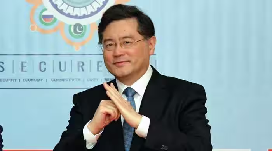Qin Gang, the former Foreign Minister of China, whose career saw a meteoric rise before hitting rock bottom with his mysterious disappearance, has now been demoted to a low-level publishing job, a report by The Washington Post stated. Ever since his disappearance, Qin’s fate has been a subject of intense speculation, with rumours making around about him being imprisoned, or dying by suicide.
But, the report says, citing two US officials, that Qin is alive but in a position very diminished from his once-lofty perch close to Chinese President Xi Jinping. He has now been nominally assigned to a low-level job at a publishing house affiliated with the Chinese Foreign Ministry. The former officials say that Qin, 58, has been placed — at least on paper — at a job with World Affairs Press, a state-owned publishing house affiliated with the Foreign Ministry, the report stated.
The demotion, which the former officials said took place sometime in the spring, is a “fall from grace” but also means “he’s off the hook,” one of the officials said. “He’s not going to jail, but his career is over.” According to the officials, this demotion serves not just as a punishment but also as a cautionary tale.
Qin was a Xi loyalist, who was promoted to foreign minister at record speed. At 56, he was not only tapped as a minister but also elevated to state councillor, a senior position that Wang Yi, Qin’s predecessor, did not achieve until his 60s, after five years as foreign minister. According to The Washington Post, His rapid rise irked colleagues, who saw him as leapfrogging others, said Christopher K Johnson, a former senior CIA China analyst and now the head of China Strategies Group, a consultancy.
Qin earned Xi’s trust as head of protocol for the Foreign Ministry from 2014 to 2017. In that role, he was responsible for the minutiae of burnishing Xi’s image on the world stage. Qin was promoted to vice minister of foreign affairs in 2018, then ambassador to the United States in 2021, a position he held for only about 18 months before returning to Beijing to become China’s youngest foreign minister since the 1950s.
Qin’s rapid ascension was perhaps the most prominent among a younger generation of aggressive diplomats often known as “wolf warriors,” after proudly nationalist Chinese action films from the 2010s, The Washington Post reported. He was “an early adopter” of the aggressive style of diplomacy, earning favour with Xi, Johnson said. “This guy was a wolf warrior before it was cool to be a wolf warrior.”
However, Qin’s time in the spotlight was brief. He disappeared from public view five months after becoming foreign minister, setting off a cascade of rumours about his downfall. He was formally dismissed in July last year after only 207 days on the job. Wang Yi, 70, returned to replace his successor as foreign minister.
But, it remained unclear what led to Qin’s ouster. A leading theory among political analysts of China is that he had an extramarital affair with a well-known Chinese television journalist, Fu Xiaotian, and the couple had a child out of wedlock born in the United States, the report stated. Notably, because censors closely guard the private lives of top officials, personal indiscretion is rarely seen as a serious offence in the male-dominated world of Chinese politics.
Fu’s celebrity lifestyle, including social media posts about meeting world leaders and travelling on private jets with her infant son, made the affair a potential security vulnerability for China, analysts said. Rumours circulated that Beijing suspected that she had been passing secrets to a foreign intelligence service, but they have never been substantiated. Fu, like Qin, has been absent from public life for more than a year, the report added
In July, the ruling Communist Party summarily dismissed several officials from the 205-member Central Committee, including the former defence minister, who had been investigated for corruption. But Qin, the readout stated, had merely “resigned” from the committee. He remained a “comrade” — a member of the Communist Party — hinting at a milder punishment, which was also the first sign that Qin was indeed alive, according to The Washington Post.
“The Politburo crediting Qin with the title of ‘comrade’ indicates that he has not been expelled from the party and could be reassigned to a new, lower-ranking role,” said Neil Thomas, an expert on Chinese politics at the Asia Society Policy Institute, a think tank. “In the Xi era, similar demotions have been meted out to leading cadres found guilty of relatively minor political infractions,” Thomas said.
It is pertinent to note that Qin’s apparent demotion follows a precedent set by Shen Guofang, a former assistant foreign minister who was abruptly reassigned in 2005 to a job as editor-in-chief at World Affairs Press. No reason was given for his move, but it was rumoured that he was being punished for an affair. Shen nonetheless kept a public profile in his new job, giving regular speeches and interviews, in which he has claimed to have no idea why he was reassigned.
Questioned about Shen’s transfer at the time, Qin, who was then the Foreign Ministry spokesman, called it “routine,” The Washington Post reported.



